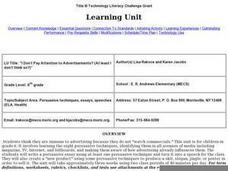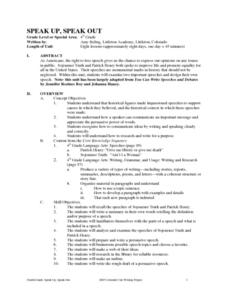Curated OER
Paint My Counties: Map Coloring the Counties of Arizona
Fourth graders identify the counties of Arizona. In this social studies lesson, 4th graders color a county map of Arizona using the fewest number of colors possible. Students write a persuasive paragraph.
Curated OER
Book Selling Project
Students create oral presentations and posters about a book they have read. They try and interest their classmates to read the book by writing persuasive reports.
Curated OER
The Aftermath of War
Students share their opinions on the war in Iraq. After reading an article, they identify the thoughts of President Bush on the conflict. In groups, they share their opinions for and against current United States policy in Iraq and the...
Curated OER
Get a Life!
Students read a New York Times article associated with the issue of the decoding for genomes, the creation of life in scientific laboratories and various genetic engineering topics. They present speeches of the pro's and con's of these...
Curated OER
Making a Pitch
Students practice creating their own persuasive pitch of their project. They use this presentation to organize the work they have completed on their project at this stage. They receive teacher and students feedback and how ready they are...
Curated OER
Seventeenth Century Pick-up Lines
Students analyze passages from The Mysteries of Love and Eloquence, or the Arts of Wooing and Complementing, written in the seventeenth century. Students analyze the images, words and figures of speech the author used and compare the...
Curated OER
Land, Liberty and the Struggle for the American Dream
Students investigate equality by reading a historical fiction book in class. In this civil rights lesson, students read the story Roll of Thunder, Hear my Cry with their classmates and define the Jim Crow Laws that kept blacks...
Curated OER
Campaign Hot Buttons
Students participate in a simulation that asks them to work as staffers for a candidate running for office. They are assigned to design, administer, and analyze a simple poll on an important community issue. Students develop a position...
Curated OER
May The Best Character Win
Students examine the financial committment to running a campaign. They discuss the difference between electroal and popular votes. They realize how involved a political campaign is!
Curated OER
Preparing to Speak
High schoolers articulate what elements must be present in a successful, persuasive speech by composing a "presentation plan." They explain what they know about speech delivery in preparation for the presentation of their final projects.
EngageNY
End of Unit 2 Assessment: A Hosted Gallery Walk
Speak your mind. Scholars present their claims in groups of three. They use a presentation checklist as each member takes a turn. At the end of the lesson plan, pupils complete an End of Unit 2 Assessment: Presenting a Claim and Findings...
Curated OER
The Rest Cure: Gender in Medicine and Literature
Read and discuss "The Yellow Wall-Paper" and the gender issues that the story brings up. Use articles from the time period to analyze, complete with specific discussion questions. After two days, scholars write an essay based on topics...
Curated OER
Emotion or Reason?
Students use persuasive devices to construct oral or written arguments. In this arguments lesson, students discuss the types of persuasive devices used in arguments and form groups to select a topic to research. Students create a...
Curated OER
I Don't Pay Attention to Advertisements
Sixth graders examine the eight persuasive techniques, identifying them in all avenues of media including magazine, TV, Internet, and billboards, and making them aware of how advertising already influences them. They write an essay using...
Curated OER
Speak Up, Speak Out
Fourth graders examine, compare, and summarize the speeches of Sojourner Truth and Patrick Henry. They review the parts of a good speech and design and give their own speech that expresses an opinion and persuades the listener..
Curated OER
The Enemy that Never Was
Students conduct research and explain in a speech why Japanese Canadians were not a threat to Canada during the Second World War.
Curated OER
The Enemy that Never Was
Students write speeches explaining why Japanese Canadians were not a threat to Canada during World War 2. In this Japanese Canadians lesson plan, students learn about racism, and how the Japanese were targeted but not a threat during the...
Curated OER
Introducing the Essay: Twain, Douglass, and American Non-Fiction
Students analyze American essayists Mark Twain and Frederick Douglass in an introduction to American literary non-fiction writing. For this essay history lesson, students identify methods for writing essays. Students read and analyze...
Curated OER
Rhetorical Devices
Eleventh graders consider rhetorical devices in speeches and then make an informed selection of effective rhetorical devices for a controversial topic presentation. Students present their findings using presentation software.
Curated OER
Rhetorical Terms
Students explore online audio examples taken from public speeches, movies, songs, lectures, oral interpretations of literature and other media events to find uses for specific rhetorical terms. This lesson includes a video of...
Curated OER
Media Literacy Unit - Part 4
Seventh graders study how advertisers use techniques to sell their products. In this persuasive media instructional activity, 7th graders analyze media messages to find the advertiser's purpose. They examine different advertising...
Curated OER
Rhetorical Devices
Twelfth graders identify and analyze examples of rhetorical devices as valid or invalid inferences. In this text analysis lesson, 12th graders research a controversial topic in teams and identify rhetorical devices for the topic....
Curated OER
It's Raining Cats and Dog: Studying Idioms
Seventh graders determine the literal and figurative meanings of idioms and research the history of idioms. In this idioms activity, 7th graders read two books by Fred Gwynne and select two idioms from the texts to research. Students...
Curated OER
Go For the Gold! For Grades 3-5
Students use web technology to investigate ancient Greece and the Olympic Games. They explore the history of the Olympics. Students make connections between Greek and English. They make and record a persuasive speech and write a...























